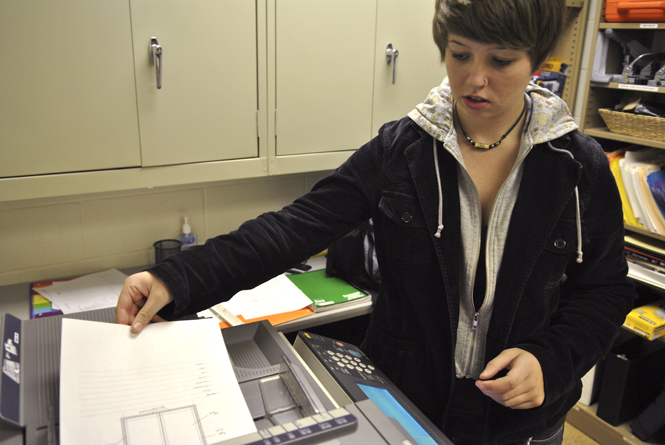Students earn money just by taking notes
Freshman visual communication design major Chloe Hackathorn turns in copies of her notes for two lecture classes one to two times a week. Students are paid by the semester and the notes are passed on to students in special need of them for certain classes through the Student Accessibility Center. Photo by Jenna Watson.
October 31, 2011
Students at Kent State can get paid for the notes they are already taking for class.
Student Accessibility Services pays $50 per semester for notes from students signed up to be SAS note takers.
Amy Quillin, associate director for Student Accessibility Services, said a wide range of students require this assistance.
“They may be physically unable, deaf and too focused on an interpreter to take notes at the same time, or have a learning disability,” Quillin said.
Kayli Futty, sophomore human development and family studies major, has been receiving note-taking assistance since freshman year. She has a visual impairment that makes her unable to see what teachers are putting on the board.
“If it wasn’t for the other students who volunteer to be note takers,” Futty said, “I would miss out on a lot of crucial information that is given in class and wouldn’t be doing nearly as well in school.”
Jay Washington, junior theatre major, said he needs notes for all of his classes and has requested note-taking assistance since his freshman year.
“There’s a lot more information and details than my own personal notes,” he said. “Ever since my freshman year they have really helped and sparked up my grades a whole lot better then before.”
#KWSASnotes
new TWTR.Widget({
version: 2,
type: ‘search’,
search: ‘#KWSASnotes’,
interval: 6000,
subject: ”,
width: 240,
height: 300,
theme: {
shell: {
background: ‘#b8b8b8’,
color: ‘#66a9c5’
},
tweets: {
background: ‘#b8b8b8’,
color: ‘#444444’,
links: ‘#1985b5’
}
},
features: {
scrollbar: true,
loop: true,
live: true,
hashtags: true,
timestamp: true,
avatars: true,
toptweets: true,
behavior: ‘default’
}
}).render().start();
Quillin said the number of students needing notes varies because students can continue to register in the SAS office throughout the semester.
“Last academic year, we had approximately 200 students request note-taking assistance for approximately 671 classes,” Quillin said.
Michelle Bridgewater, clinical mental health counsel graduate student, said she “benefits and thrives because of such wonderful, caring peers who share their notes.”
“I am grateful I have a phenomenal note taker for my courses,” she said. “A person who goes above and beyond to assist me and other students in the course that needs accommodation.”
If a SAS student puts in a request for assistance with note taking, an email is sent to the professor and forwarded to students. The students in that class then can apply to be a note taker for that class. To apply, students can go to the SAS website and look under the employment opportunities tab.
Quillin said she guesses note-taking assistance has been in place for the past 20 years.
“1990 is when the [Americans with Disabilities Act] was first enacted,” Quillin said. “Although our office, with a different name, was in existence way before that.”
Quillin said there are several reasons students should consider being a note taker.
“It depends on the person; it keeps them more accountable if they know someone is depending on their notes,” she said. “It gives them more motivation to go to class.”
Taylor Birney, a sophomore accounting major, is a note taker this year for her Art History 1 class. She said she decided to apply to be a note taker when her professor said SAS was looking for one for the class.
“I figured it would be beneficial and an easy way to earn $50,” Birney said.
Jill Koehler, sophomore early childhood education major, said she was a note taker last year for her General Psychology class to help those who needed it.
“I decided to do it because I already took detailed notes, so I decided it would be beneficial to others if I simply typed them up,” Koehler said.
Futty, a note recipient, said she agreed.
“[Note takers] are already there taking notes for themselves,” she said. “It isn’t going too far out of your way to help another student in your class who has some sort of disability and is in need of a little assistance.”
Birney said even though its a little more work than normal, she would be a note taker again.
“Since I’m required to take good, extensive notes, I am learning so much more than I would if I was not a note taker,” she said.
Contact Caitlyn Callahan at [email protected].

























